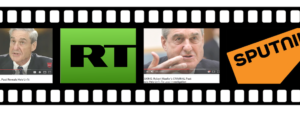 So far, Western statesmen, editors, and journalists have responded to Russian propaganda defensively: pointing out lies, rebuffing accusations, disclosing hidden motives, and demonstrating the ugliness of the Russian regime. But while such responses are natural, they are also by nature reactive, and risk helping the Kremlin by reinforcing its messaging, notes Vasily Gatov, a Visiting Fellow at the USC Annenberg Center on Communication Leadership and Policy.
So far, Western statesmen, editors, and journalists have responded to Russian propaganda defensively: pointing out lies, rebuffing accusations, disclosing hidden motives, and demonstrating the ugliness of the Russian regime. But while such responses are natural, they are also by nature reactive, and risk helping the Kremlin by reinforcing its messaging, notes Vasily Gatov, a Visiting Fellow at the USC Annenberg Center on Communication Leadership and Policy.
We need to move from reaction to a positive approach, which means rethinking the old freedom brand—and deliberately choosing the new personality, communicators, and content to fit our present moment, he writes for The American Interest:
The original “freedom brand” the United States built up in the Cold War long ago lost its coherence. The challenge for today’s public diplomats and broadcasters is to find aspects of the American idea that are still powerful and resonate with Russian audiences. To understand this will require consistent and in-depth social media sentiment analysis and target audience analysis. However, the over-arching idea should be the Pursuit of Happiness, with a sequence of supporting themes.
 Open societies ’robust institutions are vital in the fight against disinformation, according to analyst Rasmus Kleis Neilsen, who addressed a hearing on “preserving democracy in the digital age” organized by the European Political Strategy Centre, together with National Endowment for Democracy board member Anne Applebaum from the Washington Post/ LSE, Philip Howard from the Oxford Internet Institute, Philip Lelyveld from the Entertainment Technology Center at the University of Southern California and Keir Giles from Chatham House.
Open societies ’robust institutions are vital in the fight against disinformation, according to analyst Rasmus Kleis Neilsen, who addressed a hearing on “preserving democracy in the digital age” organized by the European Political Strategy Centre, together with National Endowment for Democracy board member Anne Applebaum from the Washington Post/ LSE, Philip Howard from the Oxford Internet Institute, Philip Lelyveld from the Entertainment Technology Center at the University of Southern California and Keir Giles from Chatham House.
Strengthening our institutions, he contends, involves:
- Protecting news and media against governments using political/economic pressures to control them, against organized crime and extremist groups, and against politically-mandated privatization of the policing of free speech. All European Union member states have signed the Council of Europe recommendation the protection of journalism and safety of journalists and other media actors, but so far only Malta has begun to implement the recommendation.
- C
 reating an enabling environment for news media by reforming existing forms of indirect and in some cases direct support for private sector media (VAT exemptions, state aid/subsides) so they reward the future, not the past, support genuinely independent public service media and ensure they have autonomy and funding to deliver on their remit using all appropriate tools, enable non-profit journalism by streamlining regulation to ease the creation of non-profit news organizations and incentivize supporting them, by making support available for R&D and innovation, and ensuring transparency around media ownership and funding. …
reating an enabling environment for news media by reforming existing forms of indirect and in some cases direct support for private sector media (VAT exemptions, state aid/subsides) so they reward the future, not the past, support genuinely independent public service media and ensure they have autonomy and funding to deliver on their remit using all appropriate tools, enable non-profit journalism by streamlining regulation to ease the creation of non-profit news organizations and incentivize supporting them, by making support available for R&D and innovation, and ensuring transparency around media ownership and funding. …
- Creating an enabling environment for journalism by investing in training, life-long learning, up-skilling and by protecting journalists against defamation/libel suits aiming to silence them, as well as by enabling journalists and other third parties through “freedom of information” legislation and open data initiatives, plus support for individual innovation and entrepreneurship.
- Invest in media and information literacy efforts for citizens at all stages of life.
 To counter Special Counsel Robert Mueller’s indictment an indictment against thirteen Russian nationals and three organization., RT, Sputnik, and the Kremlin used the 4Ds of disinformation as defined by @DFRLab’s Ben Nimmo: dismiss, deny, distort, and distract.
To counter Special Counsel Robert Mueller’s indictment an indictment against thirteen Russian nationals and three organization., RT, Sputnik, and the Kremlin used the 4Ds of disinformation as defined by @DFRLab’s Ben Nimmo: dismiss, deny, distort, and distract.
- Between February 16 and February 21, RT published seven articles that dismissed allegations in Mueller’s indictment. Sputnik News published another three. The dismissals centered around three themes, the group adds:
- First, it argued that Russia’s alleged meddling in the U.S. presidential elections did not have any effect on the outcome of the election.
- Second, it claimed that the scope of Russian communication campaigns has been blown out of proportion by the media and the Democrats.
- Third, it insisted that Russian meddling in the U.S. Presidential elections was not pro-Trump. Neither one of these themes denied the meddling took place.
 The European Values Think Tank/Kremlin Watch reports:
The European Values Think Tank/Kremlin Watch reports:
Dan Magaffee, Policy Director at Washington D.C.’s Center for Study of the Presidency and Congress, highlights the increasing threat of Russian and Chinese information warfare tools wielded against the West in a commentary for DefenseOne. He especially warns that military institutions cannot avoid this new type of conflict, and must rather adapt to it. His ideas are not only applicable for the United States, but for European countries as well. He writes, “Our organs of military, intelligence, and diplomacy must willingly engage in conflicts of narrative, ones in which we aggressively wield facts and the truth to counter the lies and deceptions of our adversaries.”







